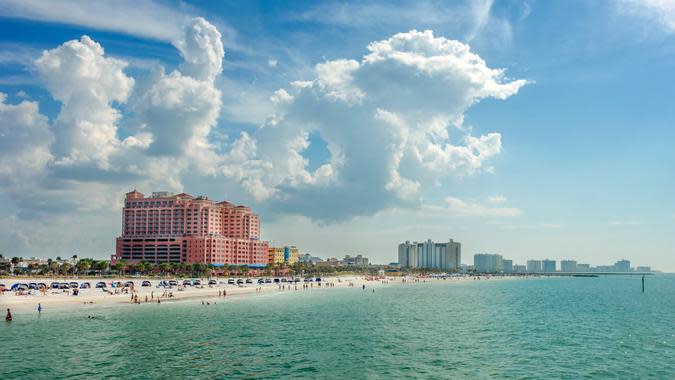10 Best Places To Retire If You Can’t Save $1 Million

In recent years, $1 million has been often quoted as the baseline amount for a comfortable retirement. Many Americans, however, may be unable to set aside a million dollars for retirement and may question where they should live for a financially secure future.
Read Here: Retired but Want To Make Passive Income? Here Are 6 Ideas for Retirees To Boost Financial Security
Learn More: 6 Genius Things All Wealthy People Do With Their Money
Fortunately, there are many cities across America where a retiree’s savings goes the distance during their retirement years. In a recent study, GOBankingRates looked at the cost of living in America’s major cities and calculated how long a nest egg of $650,000, $750,000 and $850,000 would last.
This study also considers the cities’ livability scores and the percentage of the population age 65 and older. With these factors combined, we found the 10 best places to retire in the U.S. for those who haven’t saved $1 million.

10. Huntsville, Alabama
How long $850K will last: 21.03 years
How long $750K will last: 18.55 years
How long $650K will last: 16.08 years
Livability score: 81
Percent of seniors 65 and older: 16.2%
With an average annual expenditure of $23,134 for seniors, $650,000 in retirement savings will last just about 16 years in “The Rocket City.”
See Here: 6 Frugal Living Tips Retirees Should Avoid in 2024
Discover More: What Happens to Your Social Security Check When Your Spouse Dies?
Sponsored: Credit card debt keeping you up at night? Find out if you can reduce your debt with these 3 steps

9. Spokane, Washington
How long $850K will last: 21.33 years
How long $750K will last: 18.82 years
How long $650K will last: 16.31 years
Livability score: 80
Percent of seniors 65 and older: 16.2%
Brimming with historic influence and natural beauty, retirees will never run out of ways to explore Spokane. Seniors can expect to spend $21,678 on annual expenditures in “Lilac City.”
Read More: Retirement Planning: How Much the Average Person 65 and Older Spends Monthly

8. Mesa, Arizona
How long $850K will last: 20.27 years
How long $750K will last: 17.89 years
How long $650K will last: 15.50 years
Livability score: 82
Percent of seniors 65 and older: 16.9%
Those retiring to Mesa can expect to spend $22,152 on living expenses each year. Seniors with a savings of $650,000 can afford at least 15 years in this Southwestern city.

7. Saint Petersburg, Florida
How long $850K will last: 17.67 years
How long $750K will last: 15.59 years
How long $650K will last: 13.51 years
Livability score: 86
Percent of seniors 65 and older: 19.9%
Seniors can expect to spend an average $23,522 for every year they live in Saint Petersburg. Having $750,000 in retirement savings should have retirees set for 15 years.
View Here: 7 Best Cars for Retirees on a Budget

6. Sioux Falls, South Dakota
How long $850K will last: 23.62 years
How long $750K will last: 20.84 years
How long $650K will last: 18.06 years
Livability score: 84
Percent of seniors 65 and older: 13.5%
Seniors living in the “Queen City of the West” will have an average annual expenditure of $22,115. Having $650,000 in retirement savings can last about 18 years in Sioux Falls.

5. Lexington, Kentucky
How long $850K will last: 22.32 years
How long $750K will last: 19.69 years
How long $650K will last: 17.07 years
Livability score: 86
Percent of seniors 65 and older: 14.2%
Nicknamed the “Horse Capital of the World,” the average annual expenditure for seniors is $21,461 in Lexington.
Related Article: Retirees Spend Nearly $5,000 a Month — Here’s Where Their Income Goes and How To Plan Accordingly

4. Scottsdale, Arizona
How long $850K will last: 17.66 years
How long $750K will last: 15.58 years
How long $650K will last: 13.50 years
Livability score: 77
Percent of seniors 65 and older: 25.1%
In “The West’s Most Western Town,” seniors should expect to spend $22,567 a year to cover living costs. This means an $850,000 retirement nest egg would last just about 17 years in Scottsdale.

3. Akron, Ohio
How long $850K will last: 25.13 years
How long $750K will last: 22.17 years
How long $650K will last: 19.21 years
Livability score: 80
Percent of seniors 65 and older: 15.5%
The average annual expenditure for seniors living in Akron is $21,025. That means having $750,000 saved in a retirement fund can last for 22 years.
Explore More: 7 Things Frugal Retirees Never Pay Full Price For

2. Fort Wayne, Indiana
How long $850K will last: 24.81 years
How long $750K will last: 21.89 years
How long $650K will last: 18.97 years
Livability score: 83
Percent of seniors 65 and older: 14.7%
With an average annual expenditure for seniors of $20,976, a retirement nest egg of $850,000 will stretch for 24 years in Fort Wayne.

1. Boise, Idaho
How long $850K will last: 22.37 years
How long $750K will last: 19.74 years
How long $650K will last: 17.11 years
Livability score: 83
Percent of seniors 65 and older: 15.2%
Seniors planning to retire in Boise should expect to spend $17,173 in average annual expenditures. Having $850,000 in retirement savings should have retirees set for 22 years.
Gabrielle Olya contributed to the reporting for this article.
Methodology: In this study, GOBankingRates assess places to retire for under $1 million by starting with the [1] top 150 most populated cities in the United States as sourced from the US Census American Community Survey and along with the total population, the [2] population aged 65 years and older was also included sourced from the same source. For each city on the list the cost of living indexes were sourced including; [3] Grocery cost of living index, [4] Healthcare cost of living index, [5] Utilities cost of living index, [6] Transportation cost of living index, [7] Miscellaneous cost of living index, all sourced from Sperlings BestPlaces. The cost of living indexes were multipled by the [8] Average expenditure costs within each expenditure category for someone aged 65 or older sourced from the Bureau of Labor Statistics Consumer Expenditure Survey to find the average expenditure costs within each city. The [9] average rent cost was also sourced for each city as sourced from the Zillow Observed Rental Index and added to the average expenditure cost to find the total cost of living in each city. Using this total cost of living the years of retirement drawdown can be calculated. The livability index was sourced for each location and all locations with a livability below 75 were removed as they represent places below average quality of life. The average expenditure cost was scored, the average rent cost was scored, the livability index was scored, and the percentage population 65 and over was scored with all four scores being combined and sorted to show to best places to retire if you can’t save $1 million. All data was collected and is up-to-date as-of Feb. 6, 2024.
More From GOBankingRates
Suze Orman: 5 Social Security Facts Every Soon-To-Be Retiree Must Know
The Biggest Mistake People Make With Their Tax Refund -- And How to Avoid It
This article originally appeared on GOBankingRates.com: 10 Best Places To Retire If You Can’t Save $1 Million

 Yahoo Finance
Yahoo Finance 